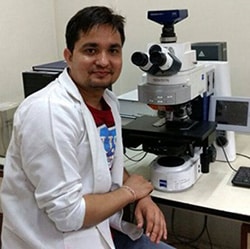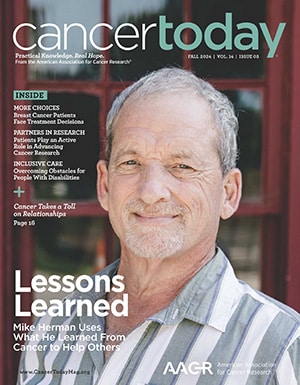For the past six years, cohorts of talented young researchers from around the world have participated in the AACR Annual Meeting through the Global Scholar-in-Training Award (GSITA) program. The 2025 GSITA awardees will be invited to attend the AACR Annual Meeting 2025, scheduled for April 25-30, in Chicago. In addition to attending the AACR Annual Meeting, GSITA alumni can also participate in future professional development and educational initiatives through the AACR Global Scholar Alumni Committee (GSAC), such as interactive workshops and networking sessions.
GSITA awardees are selected through a rigorous, peer-reviewed process. The 2025 scholars, representing Argentina, Brazil, Ethiopia, Ghana, India, Jordan, Malaysia, Nigeria, Pakistan, Turkey, and Zambia, were chosen for their outstanding promise as early-career researchers, with the hope that they would apply the education and inspiration they received from the meeting to their work in their home countries. The 2025 awardees are:
- Alessandro Pascon Filho, Barretos School of Health Sciences (FACISB), Brazil
- Blessing Olunloyo, MEd, University of Ibadan, Nigeria
- Cemile Uslu, MD, Sabanci University, Turkey
- Joaquin Merlo, MSc, Instituto de Biologia y Medicina Experimental (IBYME), Argentina
- Mariel Fusco, Instituto de Investigaciones en Medicina Traslacional (IIMT – CONICET), Argentina
- Meron Nigussie, MSc, Addis Ababa University, Ethiopia
- Muhammad Awais Khan, Khyber Medical College Peshawar, Pakistan
- Noor Al-Bzour, Jordan University of Science and Technology, Jordan
- Özlem Yedier Bayram, PhD, Research Center for Translational Medicine, Koç University, Turkey
- Patience Commey, MD, Korle Bu Teaching Hospital, Ghana
- Rafat Malik, MS, All India Institute of Medical Sciences (AIIMS), India
- Rocío Seniuk, University of Buenos Aires (CONICET-IQUIBICEN), Argentina
- Senthilmani Rajendran, MSc, Cancer Research Malaysia and Universiti Malaya, Malaysia
- Umer Khaja, PhD, Lovely Professional University, India
- Victor Mapulanga, MD, University of Zambia, Zambia
To learn more about how the GSITA experience benefits early-career researchers, we checked in with some of last year’s class and asked them to share their thoughts on how their experience helped prepare them for the next stage in their career.
Ankit Mathur, PhD, Delhi School of Public Health, Institution of Eminence, University of Delhi, India
What sorts of connections did you make at the AACR Annual Meeting? How will these connections help with the next phase of your career?
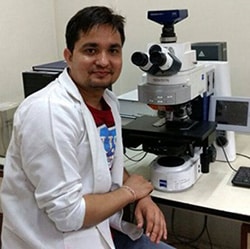
At the AACR Annual Meeting, I had the opportunity to connect with a diverse range of professionals in my field, including industry leaders, experts, peers, and potential collaborators. These connections are invaluable for several reasons. Firstly, networking with industry leaders allows me to gain insights into emerging trends, best practices, and future directions of the field. Building relationships with experts enables me to receive mentorship, guidance, and advice to further develop my skills and expertise. Connecting with peers fosters collaboration, knowledge sharing, and support networks that can be instrumental in tackling challenges and exploring new opportunities. Lastly, forming relationships with potential collaborators opens doors to exciting projects, research endeavors, and career advancement opportunities. Overall, the connections made at the AACR Annual Meeting provide a strong foundation for the next phase of my career, offering support, inspiration, and resources to help me achieve my goals and aspirations.
Yuli Magalhaes, PhD, Insitute of Chemistry, University of Sao Paulo, Brazil

How do you see the GSITA helping you in the future?
My participation funded by the GSITA grant is already yielding significant advancements for both me and my research group. I have gained access to various methodologies and equipment that were previously unknown to our group, and we are already in the process of implementing them. Additionally, I have had the opportunity to meet many individuals who will be future collaborators for our research. It was an important moment where I was able to establish direct contact with researchers willing to offer me postdoctoral positions in the near future.
Divpreet Kaur, MS, Dr. B.R Ambedkar Center for Biomedical Research, University of Delhi, India
Who would you recommend applying for the GSITA?
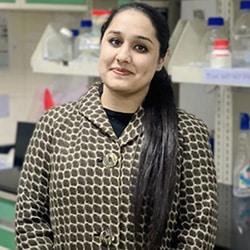
I would highly recommend this award to enthusiastic researchers, particularly those from countries with limited resources, to experience the transformative impact of the AACR Annual Meeting.
I firmly believe that without opportunities like this, we often end up working in silos, thinking on a smaller scale within our respective niches. However, platforms like these broaden your vision and inspire you to collaborate aggressively across the globe. The experience can redefine your career trajectory and provide a platform for impactful science.
Personally, I was able to connect with scientists and researchers from around the world, gaining invaluable advice and recommendations on navigating both academia and industry. These interactions have provided me with the tools and clarity to make more informed decisions about the next steps in my career. The meeting has undoubtedly made navigating my future path much easier, with greater awareness of the opportunities that lie ahead.
Mutsa Takundwa, PhD, Council for Scientific and Industrial Research (CSIR), South Africa
How do you see the GSITA furthering your opportunities?
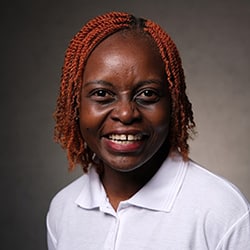
The GSITA opened a whole new world to me as a researcher as I had never attended a conference of the magnitude of the AACR Annual Meeting. More specifically as a young emerging cancer researcher, it brought all the latest advances and technologies in the field to the fore. I even managed to see some of these advances demonstrated or explained in greater detail in the main exhibition hall during breaks between sessions.
Additionally, I met other emerging researchers from different parts of the world who I hope to form collaborations within the coming years for studies where we can compare what happens in my local setting versus what would happen in another region with a similar question and problem in order to advance the field. Being part of the GSAC community also will provide lifelong opportunities to interact with leaders and peers, keeping abreast with the developments in cancer research. I have also had the opportunity to be introduced to AACR journal editors, and I see potential to publish in one of the AACR’s journals in the near future.
The post How Does the AACR GSITA Program Benefit Young Cancer Researchers? appeared first on American Association for Cancer Research (AACR).
